Quinoa – The Mother Grain
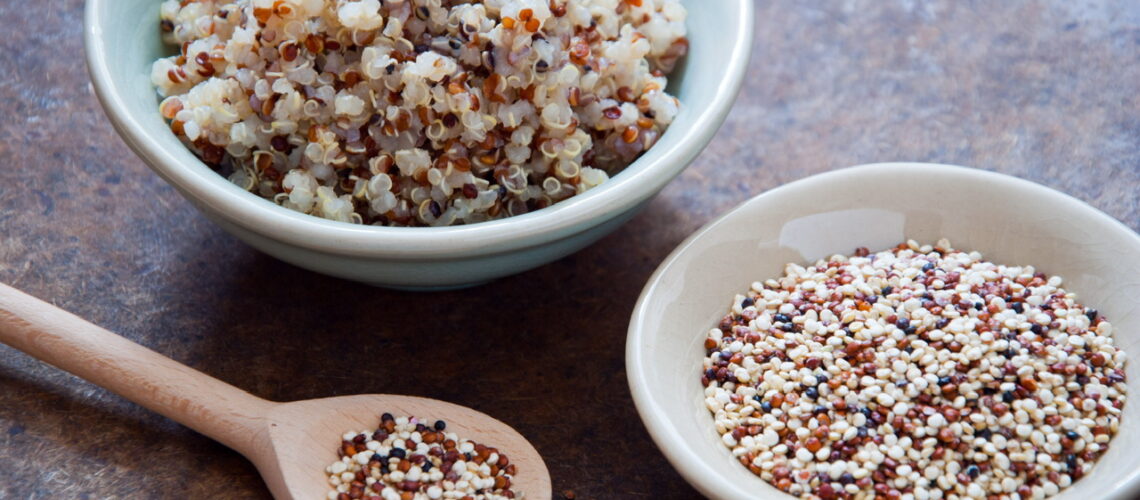
Brief History
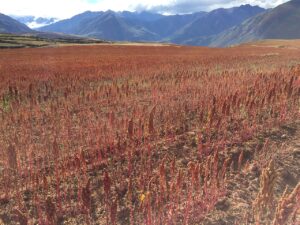
Quinoa, originating from the Quetchuan word “Kinua”, is an ancient crop grown in countries of the Andes since at least the 5th millenium B.C. It was one of the three staple foods, along with corn and potatoes of the Inca Civilization. However, the cultivation and consumption of quinoa declined partly as a consequence of the introduction of different European grains, but predominantly due to the low social prestige associated with quinoa as the food of the Indian rural population. Since the mid- 70s quinoa has been very successful in the USA thanks to its novelty value and the growth of the wholefood market with an increasing health consciousness.
Characteristics
Quinoa is an annual herb, not classified as a grain, even though this fruit seed has a similar composition to grain and is used in the same way. Quinoa seeds are shaped like rounded discs, 1.7 – 2.0 mm in diameter. Depending on the varieties the colour varies from yellow to brown to red. The husk of Quinoa usually contains a bitter substance – saponin which must be removed or washed off before consumption.
Quinoa has an excellent quality protein. It contains higher amounts of essential amino acids than other grains. For example lysine, threonin, methionin, argnin, and histidin make quinoa interesting in child nutrition. Quinoa is also a good source of fibre, complex carbohydrates, calcium, phosphorus, iron and vitamins B and E.
Taking all the aspects into consideration, quinoa may be judged as an ideal food for the provision of essential nutrients. Quinoa is gluten-free, easily digested, versatile and easy to prepare making it a welcome food source for today’s busy lifestyles.

Nutritional Value For Average Wheat and Quinoa
| Proximate | Quinoa | Wheat |
|---|---|---|
| Water | 12.6% | 13.2% |
| Protein | 13.8% | 11.5% |
| Total Lipid (fat) | 5.0% | 2.0% |
| Crude Fibres | 4.1% | 2.1% |
| Ash | 3.4% | 1.8% |
| Total Carbohydrates | 59.7% | 59.5% |
| Food Energy (calories per 100g) | ||
| 350.0 | 309.0 | |
| Minerals (mg per 100 g) | ||
| Calcium | 66.6 | 43.7 |
| Phosphorus | 408.3 | 406.0 |
| Magnesium | 204.2 | 147.0 |
| Potassium | 1040.0 | 502.0 |
| Iron | 10.9 | 3.3 |
| Manganese | 2.2 | 3.4 |
| Zinc | 7.5 | 4.1 |
Practical Uses
The seeds may be sprouted, toasted or can be ground into meal, flakes or flour from which pancakes, baked goods, and hot cereal can be made. At least 25% wheat must added to the low-gluten quinoa flour in order to bake bread. The more acceptable recipe is when quinoa is cooked in the same way as rice. It absorbs more water than rice, and develops a unique aroma during cooking.
Basic Cooking Instructions
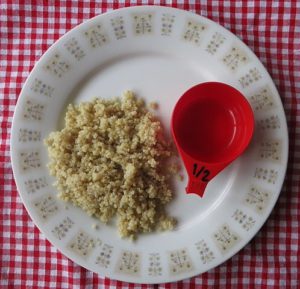
Use two cups water to one cup quinoa. Rinse quinoa thoroughly by using a strainer (or by running fresh water over the quinoa in a pot for 3 minutes and draining well). Place quinoa, seasonings, and water in a saucepan. Bring to a boil, stirring occasionally. Cover and simmer for 7 – 10 minutes. You will know that the quinoa is done when all the grains have turned from white to transparent, and the spiral-like germ has separated
This information sheet was reprinted with permission from: Grain Process Enterprises Ltd. 39 Golden Gate Court, Scarborough, ON M1P 3A4
Telephone: (416) 291-3226
Editor’s Notes:
- This info sheet says that 25% wheat flour must be used with quinoa flour in order to bake bread (due to quinoa being gluten-free). This may be true with conventional bread recipes. Bread CAN be made without gluten-based flours using different ingredient mixes and slightly different processes. Consider this Gluten-Free Breadmaker Bread recipe. It does not contain quinoa flour but uses other gluten-free flours. Quinoa flour could be tried in place of the chickpea pea flour in this recipe.
- If you are interested in cooking with quinoa flour, check out the Quinoa Category on this site.
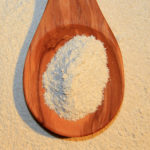
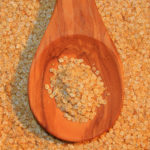
Click above thumbnails to see larger photos.
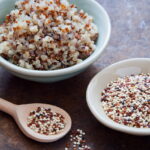
No Comments